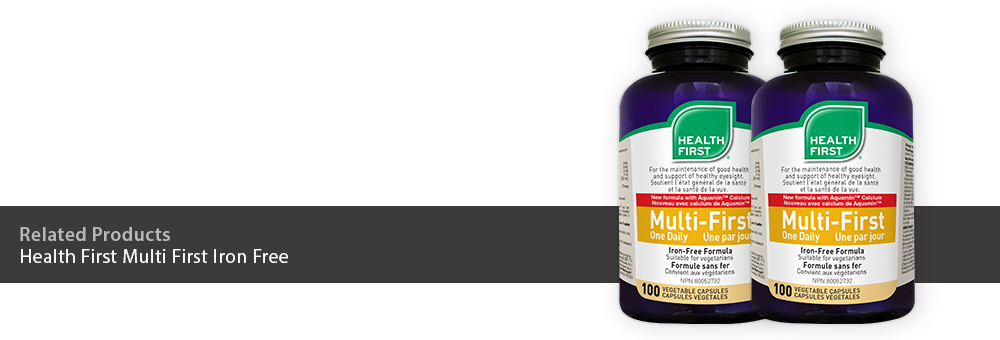

What’s in a Multivitamin?
Clearly, the best way to get nutrients such as vitamins and minerals is through a healthy diet. Fruits and vegetables, legumes, lean meats, fish and dairy products are among the foods most dense in nutrients for maintaining daily health. The vitamins and minerals found in these foods are in a form that our bodies recognize and easily absorb. While this is the ideal situation, a multivitamin can play a role in our daily lives for a number of reasons:
- Daily diet realities – While the diet outlined above sounds wonderful, it’s rarely reality. Most of us deal with busy schedules and don’t always eat the way we should. Processed foods that are high in unhealthy fats and sugars, dominate our culture and are designed to appeal to our taste buds not our nutritional health. And even when we do try to eat right, many of the foods traditionally high in nutrients, such as grains, have been stripped of much of their valuable nutritive content through depleted soils and modern processing methods. A multivitamin can act as insurance to make sure our body IS getting the base amount of vitamins and minerals every day for optimal health, no matter what direction the day’s diet goes.
- Stress – The modern Canadian lifestyle is stressful. Balancing family and work demands combined with insufficient sleep and relaxation leaves our bodies, minds and immune systems vulnerable to running down. Getting consistent nutritional support can help us get through unexpected or prolonged stressful periods.
- High performance – Those of us who are active and working out physically (or mentally) at high levels demand more out of our bodies. This extra activity uses up more nutrients. A multivitamin can help to top up even a healthy diet to help our body perform at its upper potential.
What’s in a multivitamin?
When we talk about multivitamins, it is a vague, general concept. What exactly are the nutrients in a multivitamin that we might want to supplement with on a daily basis? Some of the key nutrients are:
Vitamin D – Vitamin D supplementation is particularly important for Canadians. Because of the limited amount of sun exposure between October and April, all Canadians are challenged to get optimal levels of the “sunshine vitamin.” Obtaining sufficient vitamin D through the diet is not possible. Vitamin D is important for bone health and low levels have been linked to major diseases in several studies. The Canadian Cancer Society recommends supplementation of vitamin D for all adults to reduce disease risk. Good multivitamins will provide at least 400 IU of vitamin D.
Vitamin C – Supplementing with vitamin C is especially important for adults who do not eat enough fruits and vegetables. Vitamin C is important for the development and maintenance of bones, cartilage, teeth and gums. Vitamin C is also important for the formation of connective tissue, accelerating wound healing, enhancing immune health and as a protective antioxidant.
Vitamin B Complex – The family of B vitamins work together to support the nervous system and tissue formation and to metabolize carbohydrates, fats and proteins. People who eat a lot of foods containing refined sugars and starches may be depleting their B vitamins. The B vitamins Folic Acid and B12 help to form red blood cells. Higher levels of B vitamins help get us through periods of stress, low energy or highly demanding physical activities.
Calcium – This mineral helps in the development and maintenance of bones and teeth. Diet-wise, calcium is one of the most well-known supplementary methods for slowing bone loss. As the body ages, calcium is pulled from the bloodstream, making it less available to the bones, decreasing bone density, especially during menopause. Poor calcium absorption due to poor dietary choices, insufficient exercise, or various medications can also contribute. Calcium, vitamin D and magnesium work together as a bone-building team. Calcium supplementation is particularly important for people that are allergic to milk.
Vitamin A & Beta Carotene – These related compounds are important in maintaining eyesight, the development of night vision and immune health.
Magnesium – Magnesium works together with calcium for bone development and also in muscle functioning.
Chromium – This mineral helps to metabolize fats and carbohydrate, as well as support healthy glucose metabolism.
Iodine – Helps in the function of the thyroid gland.
Zinc – Helps to maintain immune function and healthy skin.
Phytonutrients – Well-formulated multivitamins often contain phytonutrients, or plant-based nutrients, that work together with the more concentrated vitamins and minerals. Phytonutrients such as bioflavonoids, grape seed extract, cranberry and green tea extract offer excellent antioxidant support.
Multivitamins – One of several nutritional “building blocks”
As we have seen in the paragraphs above, there are compelling reasons linked to diet and lifestyle that make supplementing with a multivitamin a wise insurance policy. Do keep in mind that no matter that how well a multivitamin is formulated, other additional “building block” or foundational supplements should also be considered for a program of complete health:
- Omega-3’s: The “healthy fats” found in fish oil help with cardiovascular health, brain functioning and reducing inflammation. Because omega-3’s are liquid and potentially unstable requiring soft gel encapsulation, they are rarely found in sufficient quantities in multivitamin formulations.
- Calcium: If you are in a high-risk demographic for osteoporosis or low bone mineral density, such as females over 40, keep in mind that due to space limitations, multivitamins can’t supply the high amounts of calcium that may be required. Consider a quality calcium supplement to go with your multivitamin.
- Probiotics: Proper digestion and nutrient absorption are vital to health. Supporting your “healthy” intestinal bacteria with a probiotic supplement can benefit overall health and assist in absorbing the nutrients in a multivitamin.
- Greens/fibre: Green supplements rich in fibre and phytonutrients are a great complement to a multivitamin, assisting with digestion and antioxidant support.
So, life IS good. Now it can be even better with the support of a daily multivitamin.

